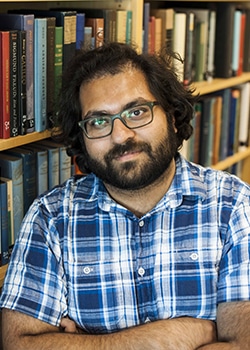Rafiq Huda – Research Investigator
Investigator:
Rafiq Huda, PhD
Name of Institution:
Rutgers University, New Brunswick, NJ
Project Title:
Harnessing astrocyte neuromodulation for alleviating the motor symptoms of Parkinson’s disease
Investigator Bio:
Dr. Huda received his BA in Biology from Carleton College in Minnesota, and his PhD in Neuroscience from Northwestern University in Illinois, followed by postdoctoral training at the Massachusetts Institute of Technology (MIT). In 2020, he joined the faculty at Rutgers University in New Jersey as an Assistant Professor in the WM Keck Center for Collaborative Neuroscience and the Department of Cell Biology and Neuroscience. His lab studies how interactions between specific cell populations in the central nervous system contribute to complex behavioral functions like motor control, and how neuromodulation of these circuits can be used for novel circuit-based therapies for neuropsychiatric and neurodegenerative disorders, including Parkinson’s disease (PD).
Objective:
This project tests the hypothesis that astrocytes, a cell type in the brain that supports various functions of the neurons, are critical in the neural circuity that controls movement.
Background:
Current therapies to treat motor symptoms of PD predominantly work by supplementing lost dopamine signaling. Another strategy may be to bypass the dopaminergic system and directly target a cell type, the astrocyte, whose functional role in the brain circuitry controlling movement is just now being explored. Astrocytes have highly-branched processes that surround neurons and the connections between neurons called synapses. They are known to modify and influence synaptic transmission and neuronal activity. However, it is unknown how astrocytes specifically contribute to motor control and how dopamine loss changes the function of astrocytes. We hypothesize that dopamine loss is associated with reduced astrocyte calcium signaling, which compromises neuronal network activation during movement. Therefore, augmenting astrocyte calcium may improve motor function in PD.
Methods/Design:
We will aim to show that astrocyte calcium signaling can be harnessed to alleviate the motor symptoms of PD. We recently pioneered high-resolution two-photon imaging of striatal astrocytes to study the in vivo functioning of astrocytes in motor control. Using this technique, we will test whether astrocyte calcium signaling is associated with locomotion and how this process is disrupted in a mouse model of PD. We will use molecular genetics approaches to modulate calcium signaling in astrocytes and test whether activating astrocyte calcium signaling improves locomotion in dopamine-depleted mice.
Relevance to Diagnosis/Treatment of Parkinson’s disease:
These experiments will establish novel roles for astrocytes in the control of brain circuits known to be affected in PD, paving the way for next-generation astrocyte-targeted therapies for PD.

